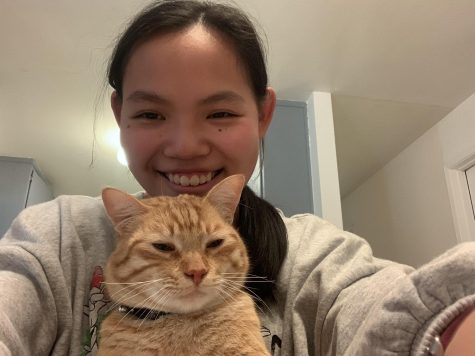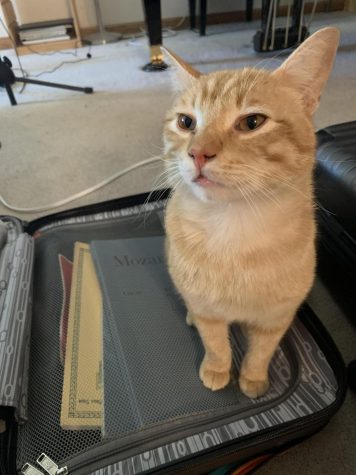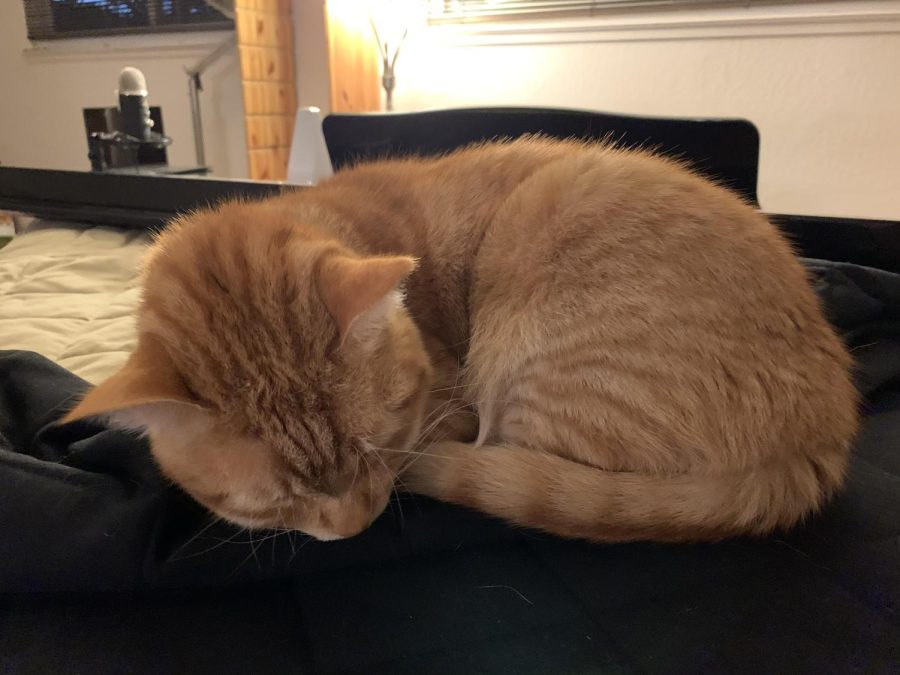Developing a kinship
Learning to love the things I didn’t think I could
Caramel forms the shape of a croissant as he curls up on top of a grand piano to take a nap.
April 23, 2022
Curled up at the foot of my bed is a croissant-shaped blob named Caramel. While I type, he purrs with the deep frequency of a motorboat. Every few minutes, he stretches out his tiny paws, yawns and settles back in for more sleep.
There was a point when I felt nothing for him.
My family adopted Caramel in April of 2021, surprised by my mom when she made the sudden announcement that a cat would be arriving at our house the next week. At the dinner table, she showed us pictures of a one-year-old cat with orange fur who was just a bit round. When he first arrived, I wasn’t sure about my ability to connect with such a strange new creature. I couldn’t pinpoint a reason for why I didn’t like him, but I just felt empty. Where was this sudden love that I was supposed to have the moment I saw him?
Around the same time, I had a friend who also got a cat. I compared my feelings for Caramel with her overflowing affection for her new cat, and I felt guilty for not loving Caramel more. So when my parents told me I had to stop paying so much attention to him, I was surprised. I hadn’t even noticed how much time I was spending with him. But was my infatuation genuine, or was I just attempting to replicate what was supposed to be there?

I never did get my question answered, because, at some unknown point, my feelings toward Caramel developed into genuine love. When the house grew lonely and I’d be the only one up on late nights, he always found a way to be by my side. While I continuously banged my head against a math textbook, averaging about one homework problem per two head bangs, Caramel made biscuits on the bed next to me. When my older brother left for college, leaving me as an only child at home for the first time, he became the company I always relied on. Our shared love of food, sleep and constant affection helped us bond, and the nights when he would scratch at my door no longer felt annoying. Instead, I would look at his face, his big eyes desiring love, and let him inside.
Although I did initially doubt that I could ever really feel for my cat the way others did, he became a constant in my life that I could rely on to

make me feel better. I had something to look forward to after school every day. On my worst days, I easily scooped him up into my arms and hugged him, his fuzzy face pressed up against mine, a comfort that seemed to last forever. I grew to love him, to really love him.
So often, it feels as though the things you feel nothing for or the things you hate will never evolve beyond that. But that’s not how feelings work. They grow, they develop and they become more than what you thought could be possible. Using my experiences with Caramel as an example, I applied this positive growth mindset to other things I found difficult to love — physics, math and music theory. These things became more and more bearable until I truly began to enjoy them. By keeping an open mind and working through my dislike, the time I spent with these subjects strengthened my relationships with them until I ultimately felt confident and genuinely enjoyed them.
Maybe there will be things that seem as though they will never be a source of happiness, but you never know until you really try to love them. With a mindset that’s open to appreciation, you can live a little happier, worry a little less and love a little more.


















